Canada’s Immigration Minister Ahmed Hussen will travel to Nigeria later this month in an effort to find a way to stem the flow of Nigerian migrants who travel to the United States on tourist visas but then cross into Canada through irregular border crossings to claim asylum in the country, federal officials said Monday.
Ottawa has also deployed three additional duty officers to Lagos, Nigeria, so they can work with U.S. authorities in processing visa applications at the U.S. embassy in the capital Abuja and the consulate in Lagos, Hussen said at a joint press conference in Montreal with his cabinet colleagues Transport Minister Marc Garneau and Public Safety Minister Ralph Goodale.
“A number of recent asylum claimants are Nigerian nationals with valid U.S. visas and it’s becoming apparent to us that they’ve obtained these visas to come to Canada and make asylum claims,” said Hussen. “So for the last number of months, we’ve been working very closely with our U.S. counterparts to address this particular situation.”
In response to Canadian concerns, American officials have stepped up their efforts to deny visas to Nigerian nationals they suspect want to travel to the U.S. with the sole purpose of crossing into Canada to claim asylum there, Hussen said.
Funding to beef up border security and refugee system
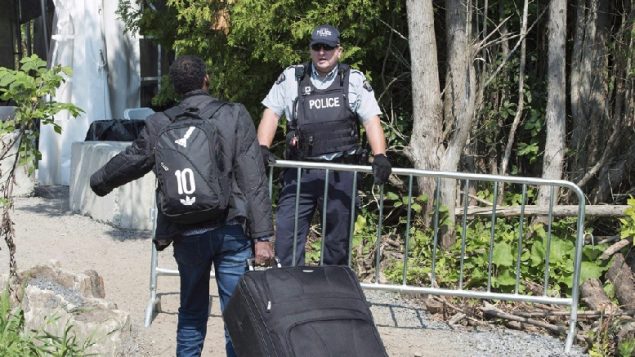
An asylum seeker is confronted by an RCMP officer as he crosses the border into Canada from the United States on August 21, 2017. (Paul Chiasson/THE CANADIAN PRESS)
The federal government is also investing $173 million in additional funding to strengthen security on the U.S.-Canada border, officials said.
The 2018 budget also allocated $74 million in funding to hire 64 additional officials for Canada’s Immigration Refugee Board to speed up the process of hearing asylum claims and work through the backlog 17,000 asylum requests and more than 3,000 appeals caused by the influx of irregular migrants from the U.S., Hussen said.
The federal government will also be working closely with the government of Quebec, which has received the majority of irregular migrants, to compensate the province for the costs incurred in hosting the new arrivals, said Garneau. About 2,500 asylum seekers crossed into Quebec from the U.S. in April, Garneau said.
Ottawa will also be working with provincial authorities in Ontario and Quebec to relieve the pressure on Toronto and Montreal as the main recipients of new migrants, Garneau said.
‘Not a free ticket’
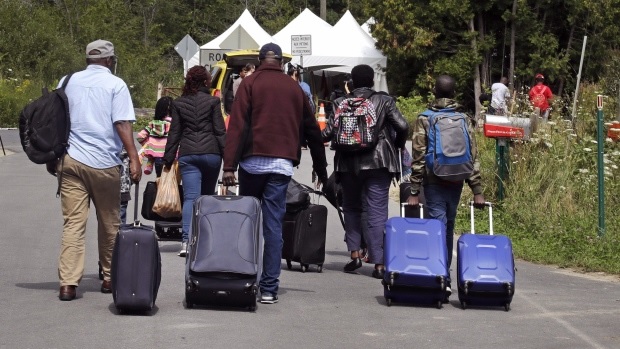
FILE PHOTO: (Aug. 2017) A family from Haiti haul their luggage towards the Canada-US border before crossing illegally into Quebec to claim asylum. (Charles Krupa/Associated Press)
Seeking asylum at the border is not a free ticket of entry into Canada, said Garneau.
“They must go through a rigorous process,” Garneau said. “We believe that a little more than 90 per cent of irregular migrants do not meet our criteria and will need to leave.”
The Liberal government has come under growing pressure from the opposition Conservatives to crack down on the irregular crossings.
Those who cross the border through irregular border crossings in violation of the rules are immediately arrested, said Goodale.
“They are carefully interviewed, they are identified both biographically and biometrically, their identities are checked against Canadian and United States databases for any immigration, security or criminal flags and they are issued a conditional removal order,” Goodale said. “If they present a risk, they can be detained as necessary.”
They are then required to prove their claim for asylum in Canada, Goodale said.
Seeking asylum is not a shortcut around normal immigration rules and procedures, there must be legitimate reasons for why asylum is necessary, he said. People who cannot prove their case become inadmissible and can be removed from Canada, Goodale said.
Outreach worked, Liberals say
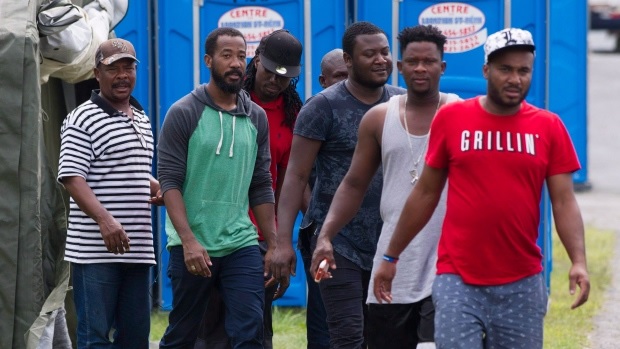
Asylum seekers step out of a temporary processing tent to receive lunch at the Canada-United States border in Quebec. Thursday, August 10, 2017. (Graham Hughes/THE CANADIAN PRESS)
About 200 irregular asylum seekers will be deported in coming weeks, Garneau said.
Hussen said the resources deployed to deal with the influx of asylum seekers in no way impact other categories of immigrants such as family reunification and economic classes of immigration.
Garneau said the outreach by Canadian officials to members of Canada’s Haitian and Latin American communities to explain to them the realities of the immigration and refugee determination process has born its fruits.
“We have seen a drastic reduction recently in the number of asylum seekers of Haitian origin who represented the majority of people coming to the border last year,” Garneau said. “At the same time the influx of Latin American migrants did not materialize.”
Managing the border
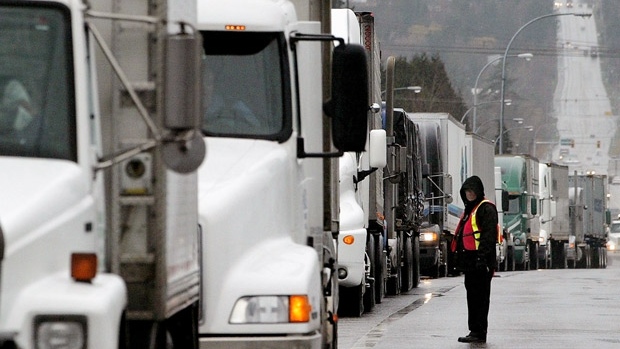
Over $2.4 billion worth of goods and services cross the Canada–U.S. border daily, according to the Canadian government. (Andy Clark/Reuters/file)
Canada and the United States share “the longest, the most open, unmilitarized and the most successful international boundary in the history of the world,” said Goodale.
Some 400,000 people and nearly $2.5 billion in trade cross the border every day, he said.
“As we manage that enormous flow, almost all of it hassle-free, 24 hours a day and 365 days of the year, we are determined to ensure that every Canadian law is properly enforced and all of Canada’s international obligations are properly respected,” Goodale said.
About 70 to 80 people a day cross the border irregularly from the U.S. state of New York into Canada near the official border crossing of Saint-Bernard-de-Lacolle on the Quebec side of the border, Goodale said.
“Up to now we have had sufficient capacity to manage such volumes and to move people away from the border promptly,” Goodale said.
However, in the near future the federal government will be adding extra housing facilities at Lacolle to make sure that families with children are treated appropriately if their stay at the border has to last more than one day, Goodale said.
‘We are not totally immune’
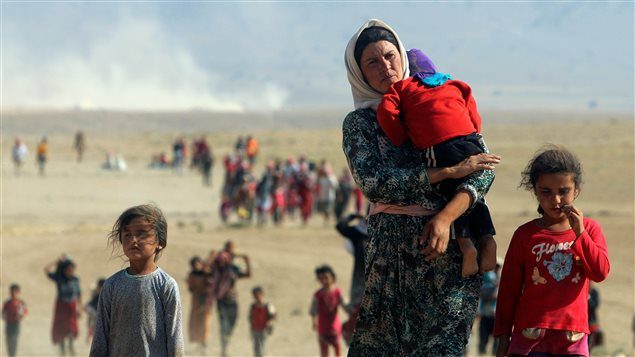
Displaced people from the minority Yazidi sect, fleeing violence from forces loyal to the Islamic State in Sinjar town, walk towards the Syrian border on the outskirts of Sinjar mountain near the Syrian border town of Elierbeh of Al-Hasakah Governorate in this August 11, 2014.
( Rodi Said / Reuters)
The Liberal government announced last week that it would build temporary housing for up to 520 people at Saint-Bernard-de-Lacolle.
The opposition Conservatives say that the Liberal government is effectively setting up a refugee camp at the border.
“Wars, terrorism and persecution in various parts of the world, and due to damages caused by climate change, failed and failing states, economic dysfunction and other factors global human dislocation and migration are higher now than at any time since the Second World War,” Goodale said.
“Because of our geographic location in North America Canada is somewhat shielded from this global phenomenon but we are not totally immune.”
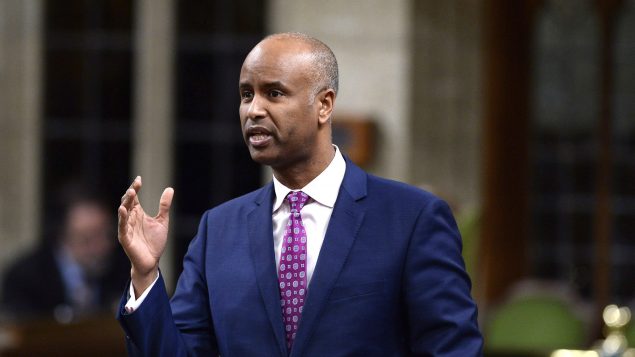






For reasons beyond our control, and for an undetermined period of time, our comment section is now closed. However, our social networks remain open to your contributions.